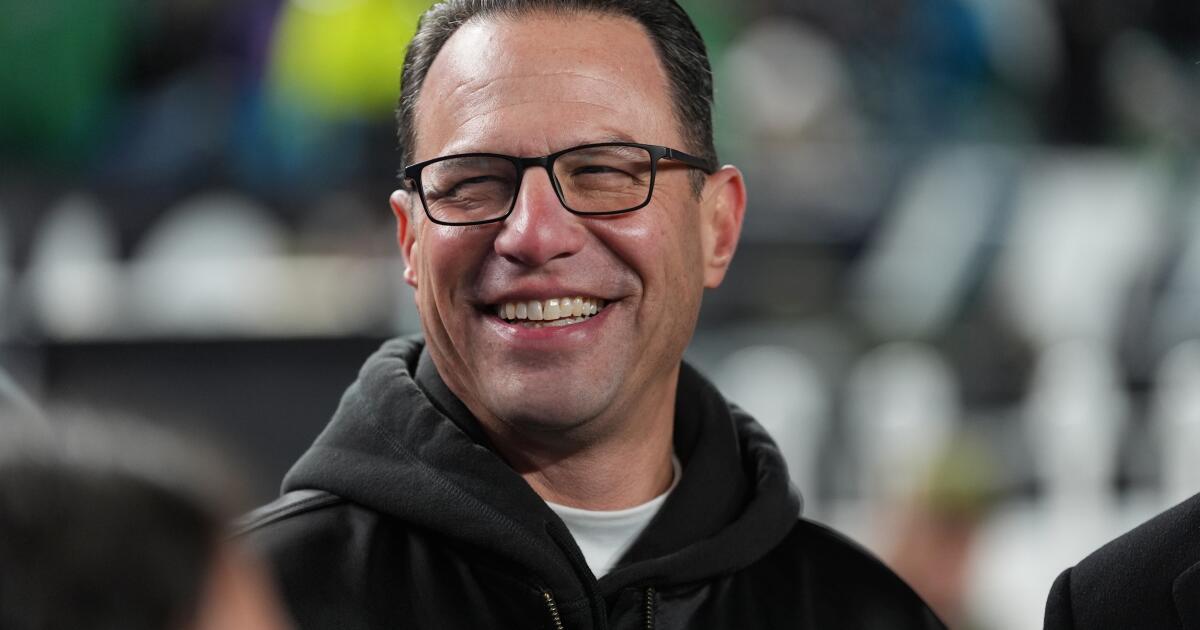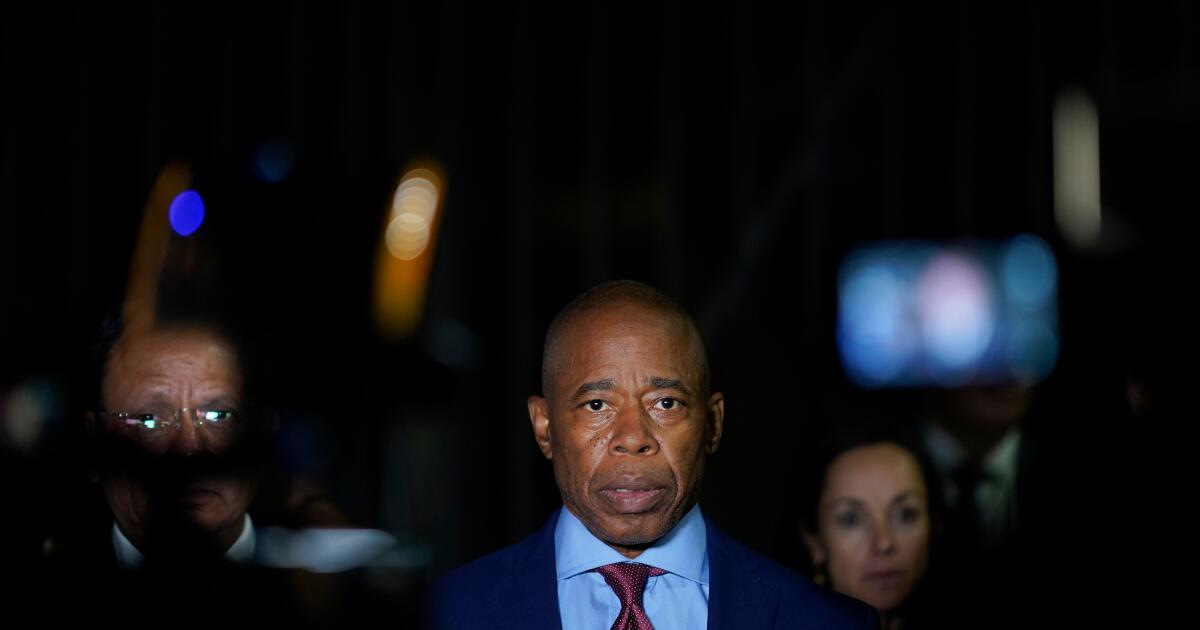Josh Shapiro running for 2nd term as Pennsylvania governor, trailed by talk of 2028 White House bid
HARRISBURG, Pa. — Pennsylvania Gov. Josh Shapiro is running for a second term in the pivotal battleground state after a first term that put him on the Democratic Party’s radar as a potential presidential contender in 2028.
He made the formal announcement Thursday at an event at a carpenters’ union hall in Pittsburgh and, later, at a similar event in Philadelphia. Shapiro’s announcement demonstrated a unified party behind him — including introductions by the state party chair, labor leaders and top local Democratic officials — as he ticked off his accomplishments during a nearly 30-minute speech.
Shapiro warned that his opponents promise “darkness and division and extremism,” and — without mentioning President Trump by name — he slammed the “chaos and toxicity” emanating from Washington, D.C., that he said threatened livelihoods, rights and freedoms.
“Every step of the way, I’ve stood up for my fellow Pennsylvanians, sometimes in a court of law and other times simply refusing to back down, refusing to cast certain Pennsylvanians aside and always by speaking truth to power,” Shapiro said.
He added, “I will not let anyone mess with Pennsylvania and I will always have your backs.”
Although Shapiro hasn’t disclosed any ambitions for higher office, his reelection effort will be closely watched as another test of whether he’s White House material.
Ever since he won the governor’s office in a near-landslide victory in 2022, Shapiro has been mentioned alongside Democratic contemporaries like California Gov. Gavin Newsom, Illinois Gov. JB Pritzker, Maryland Gov. Wes Moore and others as someone who could lead a national ticket.
Shapiro, 52, has already made rounds outside Pennsylvania. Last year, he campaigned for Democrats running for governor in New Jersey and Virginia, and he’s a frequent guest on Sunday talk shows that can shape the country’s political conversation.
He was also considered as a potential running mate for Kamala Harris in 2024. She chose Minnesota Gov. Tim Walz instead.
A pivotal first term as governor
Shapiro’s first term repeatedly put him in the spotlight.
He was governor when Pennsylvania was the site of the first attempted assassination of Trump; the capture of Luigi Mangione in the killing of United Healthcare Chief Executive Brian Thompson; and the murder of three police officers in the state’s deadliest day for law enforcement since 2009.
Last year, an arsonist tried to kill Shapiro by setting the governor’s official residence on fire in the middle of the night. Shapiro had to flee with his wife, children and members of his extended family, and the attack made him a sought-out voice on the nation’s recent spate of political violence.
As Shapiro settled into the governor’s office, he shed his buttoned-down public demeanor and became more plain-spoken.
He pushed to quickly reopen a collapsed section of Interstate 95 in Philadelphia, debuting his new and profane governing slogan — “get s— done” — at a ceremony for the completed project.
He crossed the partisan divide over school choice to support a Republican-backed voucher program, causing friction with Democratic lawmakers and allies in the state.
Shapiro regularly plays up the need for bipartisanship in a state with a politically divided Legislature, and positions himself as a moderate on energy issues in a state that produces the most natural gas after Texas.
He’s rubbed elbows with corporate executives who are interested in Pennsylvania as a data center destination and thrust Pennsylvania into competition for billions of dollars being spent on energy, manufacturing and artificial intelligence.
A repeat winner in competitive territory
Shapiro has enjoyed robust public approval ratings and carries a reputation as a disciplined messenger and powerhouse fundraiser. For 2026, Pennsylvania’s Republican Party endorsed Stacy Garrity, the twice-elected state treasurer, to challenge Shapiro.
Garrity has campaigned around Pennsylvania and spoken at numerous Trump rallies in the battleground state, but she is untested as a fundraiser and will have to contend with her relatively low profile as compared with Shapiro.
Shapiro, meanwhile, keeps a busy public schedule and has gone out of his way to appear at high-profile, nonpolitical events like football games, a NASCAR race and onstage at a Roots concert in Philadelphia.
He is a regular on TV political shows, podcasts and local sports radio shows, and became a leading pro-Israel voice among Democrats and Jewish politicians amid the Israel-Hamas war, confronting divisions within the Democratic Party over the war.
He has tempered it with calls for more aid for Gaza’s residents and criticism of Prime Minister Benjamin Netanyahu’s handling of the war, but some activists argued against him being the party’s nominee for vice president in 2024.
Harris, in her recent book, wrote that she passed on Shapiro after determining that he wouldn’t be a good fit for the role.
Shapiro, she wrote, “mused that he would want to be in the room for every decision,” and she “had a nagging concern that he would be unable to settle for a role as number two and that it would wear on our partnership.” Shapiro disputed the characterization.
An audition on the 2026 campaign trail
In a September appearance on NBC News’ “Meet the Press,” the host, Kristen Welker, asked him whether he’d commit to serving a full second term as governor and whether he’d rule out running for president in 2028.
“I’m focused on doing my work here,” he said, sidestepping the questions.
His supposed White House aspirations — which he’s never actually admitted to in public — are also mentioned frequently by Garrity.
“We need somebody that is more interested in Pennsylvania and not on Pennsylvania Avenue,” Garrity said recently on a radio show in Philadelphia. On Thursday, the Republican Governors Assocn. accused Shapiro of being “more focused on his political ambitions” than leading Pennsylvania.
For his part, Shapiro criticizes Garrity as too eager to get Trump’s endorsement to be an effective advocate for Pennsylvania.
In any case, the campaign trail could afford Shapiro an opportunity to audition for a White House run.
For one thing, Shapiro has been unafraid to criticize Trump, even in a swing state won by Trump in 2024. As governor, Shapiro has joined or filed more than a dozen lawsuits against Trump’s administration, primarily for holding up funding to states.
He has lambasted Trump’s tariffs as “reckless” and “dangerous,” Trump’s threats to revoke TV broadcast licenses as an “attempt to stifle dissent” and Trump’s equivocation on political violence as failing the “leadership test” and “making everyone less safe.”
Many of Shapiro’s would-be competitors in a Democratic primary won’t have to run for office before then.
Newsom is term-limited, for instance. Others — like ex-Transportation Secretary Pete Buttigieg — aren’t in public office. A couple of other governors in the 2028 conversation — Moore and Pritzker — are running for reelection this year.
Levy writes for the Associated Press.

